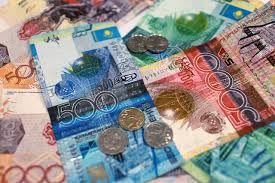 On February 11, Kazakhstan's central bank devalued the national currency, the tenge, by 19 percent against the US dollar. It said the gradual decrease of the US Federal Reserve's stimulus program had led to a capital outflow from developing countries to developed ones and the central bank was not able to maintain the exchange rate of the tenge by selling dollars.
On February 11, Kazakhstan's central bank devalued the national currency, the tenge, by 19 percent against the US dollar. It said the gradual decrease of the US Federal Reserve's stimulus program had led to a capital outflow from developing countries to developed ones and the central bank was not able to maintain the exchange rate of the tenge by selling dollars.
Kazakhstan is dependent on exporting energy and raw materials. Yet it needs to import food, industrial goods and mechanical equipment. The devaluation of the tenge can quickly emerge in this trade structure: The price competitiveness of exported commodities will increase, imports reduced and the development of domestic enterprises will be encouraged. As international oil prices remain high, the devaluation of the tenge can also boost the budget income. As a result, Kazakh President Nursultan Nazarbayev stressed that the country's GDP would be projected to grow by at least 6 percent.
It was in 2009 amid the global financial crisis that the tenge was first significantly devalued. To make the economy grow steadily, the central bank made the tenge tumble from an exchange rate of about 120 to the US dollar to around 150. In 2010, the bank did not set a one-off currency devaluation. Instead, it set a range for the floating exchange rate to keep both the exchange rate and economy steady.
Therefore, in the eyes of some market analysts, the timing and means of the tenge devaluation this time is surprising. Kazakhstan can still keep the surplus of its ordinary projects and foreign currency balance and its macro economy is stable, but the one-off currency devaluation could lead to the shrinking fortunes of citizens and severe inflation which will result in social instability.
In fact, within Kazakhstan, there have already been circumstances that have squeezed foreign currencies, caused a rise in price of commodities and protests from the public. The Kazakhstan government has issued a number of policies to restrict prices from rising. Nazarbayev underlined that ordinary people should not be affected by the tenge devaluation. It remains to be seen how these measures can be implemented.
The impact of the devaluation of the Russian currency ruble on the tenge needs to be emphasized. Russia and Kazakhstan are members of the Custom Union that also includes Belarus. The two have an identical trade structure. For Kazakhstan, Russian goods take up 37.1 percent of Kazakhstan's imported goods. Some goods, such as food, refined oil, machines and steel products, play a vital part in Kazakhstan's consumption.
Compared with Kazakhstan, Russia has adopted a policy of devaluating the ruble on a long-term but small-scale spectrum to deal with the outflow of capital. The consistent devaluation of the ruble puts Kazakhstan in a disadvantageous position in its trade with Russia in the international market. This is one of the external factors for Kazakhstan's devaluation
As Kazakhstan's Ministry of Economy and Budget Planning has stated, the outflow of capitals has triggered competing devaluations among emerging economies. In the long run, the country may risk losing competitiveness. Prime Minister Serik Akhmetov has decided to adopt new measures to attract foreign investment. But in a climate when the risk of exchange rate increases, it is not that easy.
The current Ukraine crisis only makes the situation worse. Russia's stock market and currency market have already shown a sign of declining. Some experts have predicted another financial crisis such as that Russia experienced during the Russo-Georgian war in 2008. Meanwhile, the currency of Ukraine has also devalued to a new record low.
As the currencies of Russia, Ukraine and Kazakhstan have all devalued, the fluctuation of currency in these former Soviet republics may have chain effects, which needs considerable attention from the market.
The author is an assistant research fellow at the Academy of Chinese Energy Strategy with the China University of Petroleum, Beijing.




